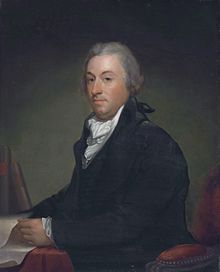Robert Livingston | |
|---|---|
 | |
| 7th United States Minister to France | |
| In office December 6, 1801 – November 18, 1804 | |
| President | Thomas Jefferson |
| Preceded by | Charles Cotesworth Pinckney |
| Succeeded by | John Armstrong |
| 1st United States Secretary of Foreign Affairs | |
| In office October 20, 1781 – June 4, 1783 | |
| Appointed by | Congress of the Confederation |
| Preceded by | Position established |
| Succeeded by | John Jay |
| 1st Chancellor of New York | |
| In office July 30, 1777 – June 30, 1801 | |
| Governor | George Clinton John Jay |
| Preceded by | Position established |
| Succeeded by | John Lansing |
| Personal details | |
| Born | November 27, 1746 New York City, New York, British America |
| Died | February 26, 1813 (aged 66) Clermont, New York, U.S. |
| Political party | Democratic-Republican |
| Spouse |
Mary Stevens (m. 1770) |
| Children | 2 |
| Relatives | Robert Livingston (father) Edward Livingston (brother) Robert Livingston (grandfather) |
| Education | Columbia College (BA) |
| Signature | |
Robert Robert[a] Livingston (November 27, 1746 (Old Style November 16) – February 26, 1813) was an American lawyer, politician, and diplomat from New York, as well as a Founding Father of the United States. He was known as "The Chancellor" after the high New York state legal office he held for 25 years. He was a member of the Committee of Five that drafted the Declaration of Independence, along with Thomas Jefferson, Benjamin Franklin, John Adams, and Roger Sherman, but was recalled by the state of New York before he could sign the document. Livingston administered the oath of office to George Washington when he assumed the presidency April 30, 1789. Livingston was also elected as a member of the American Philosophical Society in 1801.[1]
Cite error: There are <ref group=lower-alpha> tags or {{efn}} templates on this page, but the references will not show without a {{reflist|group=lower-alpha}} template or {{notelist}} template (see the help page).
- ^ "APS Member History". search.amphilsoc.org. Retrieved 2021-03-31.